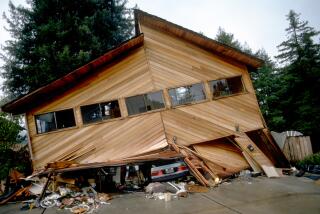A Squeaky Floor That Broke the Deal
- Share via
Question: From a Realtor’s perspective, it’s hard to know which problems justify the cancellation of a sale. On a recent home inspection, only five problems were found. Most were minor concerns such as leaves in the rain gutters and a missing outlet cover. The big issue involved squeaking floors.
My client is very robust, and the floors squeaked wherever he walked. The seller agreed to refasten the subfloor with screws. This solved the problem for persons of average stature, but not for my large client. In fact, some of the floors flexed when he walked on them. He canceled the sale.
Do you believe this was a valid reason to back out of the contract?
Answer: Every buyer has a personal perspective on which types of defects are deal-breakers. Some buyers are not deterred by issues as large as major foundation cracks, while others will run from seemingly routine disclosures. Some expect a seller to repair every nitpicky detail, while others are willing to buy “as-is.”
Squeaky floors are common in homes with raised foundations, and most buyers accept them as a personality aspect of the home. Usually additional subfloor fasteners, such as screws, are sufficient to eliminate this minor problem.
In your situation, the floor joists could probably use structural reinforcement. Beams installed beneath the flexing floor joists might have solved the problem.
Bamboo Takeover Is a Nasty Surprise for Owners
Q: Shortly after buying our home, bamboo began sprouting all over our backyard. At first we picked them out, but for every one we picked, two grew back. These sprouts are sharp as needles and make the yard unsafe for our children. The gardener told us the previous owners were aware of this, but it was never mentioned in their disclosure statement. We’re told the bamboo will eventually take over our lawn, and the bid to eliminate it is $11,000. Are the sellers liable for these costs?
A: The sellers probably should have disclosed this. However, when asked to list defects, certain items don’t come to mind because they aren’t viewed as defects. Arguably, bamboo growth could qualify as one of those items.
Ask yourself the following question: “If the bamboo had been listed in the seller’s disclosure statement, would I have required them to correct it as a condition of the sale?” For many buyers, especially in a sellers’ market, the answer would be “no.”
Consider also that you might have read that disclosure but passed it over as a minor concern, not realizing how problematic it would prove to be.
Given the safety implications, it’s understandable that you would want to take issue with the sellers. It’s even conceivable you’d win a judgment in Small Claims Court. Unfortunately, you’d yield less than half the amount of your landscaper’s bid--which warrants review. Why would $11,000 be needed to eradicate a yard of bamboo? Unless you have an unusually large yard, a simple treatment of Round-Up to the infested areas, a cleanup and reseed would be all that was needed. Perhaps another bid or two is in order.
Sparkling New Home Can Still Have Serious Defects
Q: I’ve read your articles recommending home inspections for newly constructed houses but never took this advice seriously. Recently, I purchased a new home that seemed so perfect I never considered an inspection. Now, I’m finding numerous problems, and the builder is too busy to make repairs or return my calls.
A: You’re not alone. Most buyers of new homes overlook the vital benefits of a home inspection. The fresh aspect of new construction is deceiving, and the extent of building inspections is largely misunderstood.
Human nature prevents even the best-built homes from being constructed flawlessly, and building departments simply lack the manpower necessary to evaluate all aspects of a property.
Condos Lack Individual Water Shutoff Valves
Q: Our condominium complex was built in the early 1990s, and we have already experienced several leaks in the water piping. That wouldn’t be so bad if each condo had its own water supply shutoff valve. Whenever a leak is repaired at one unit, the water to all units must be turned off.
Our owners’ association requested that separate valves be provided, but we were told that this is not required by code. What should we do?
A: The Uniform Plumbing Code specifically requires “that supply piping to a single family residence ... be controlled on one valve.” If your condo complex does not have a separate water supply valve for each living unit, then the builder messed up, and the building inspector failed to identify the problem prior to approving the project.
If the persons responsible for this mistake are not convinced that separate valves are mandated, have them read section 605.2 of the plumbing code. If they’re using the old code, that’s section 1005(b).
*
If you have questions or comments, contact Barry Stone through his Web site at https://www.housedetective.com. Distributed by Access Media Group.
More to Read
Inside the business of entertainment
The Wide Shot brings you news, analysis and insights on everything from streaming wars to production — and what it all means for the future.
You may occasionally receive promotional content from the Los Angeles Times.










